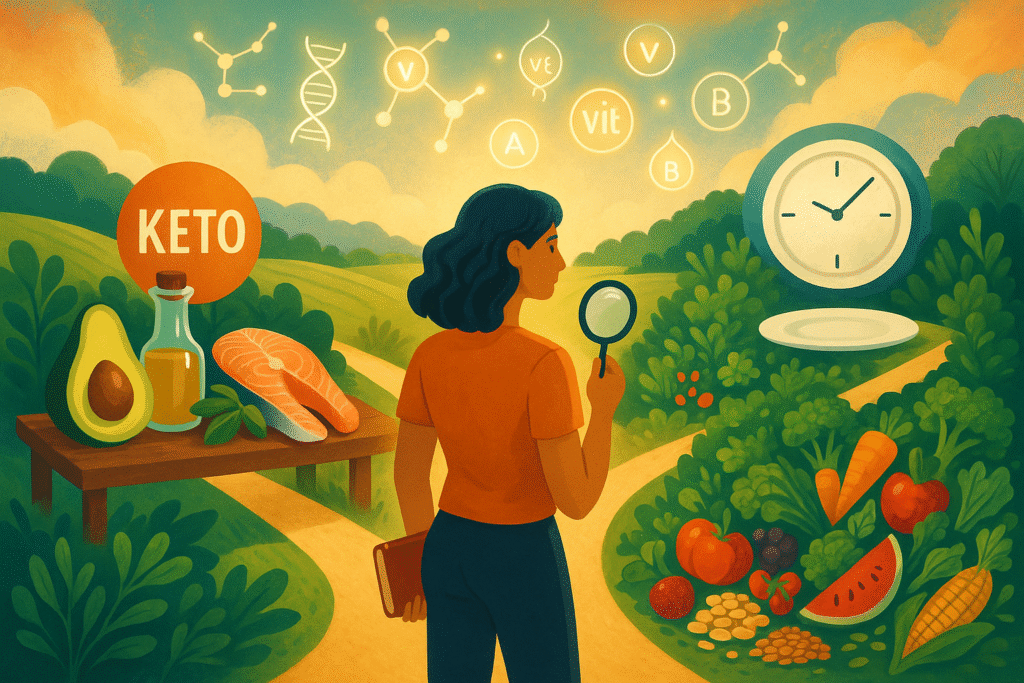The Dark Side of Popular Diet Trends—Revealed
By Dr. Maya Lee
Every year, new diet trends emerge, promising rapid weight loss, boundless energy, or a cure for all ailments. From ketogenic to plant-based, intermittent fasting to paleo, the sheer volume of information—and often misinformation—can be overwhelming. It's easy to feel lost in a sea of conflicting advice, wondering which path truly leads to sustainable health.
As a clinical nutritionist, my role is not to dictate what you should eat, but to empower you with the knowledge to make informed choices. My gentle approach encourages you to look beyond the hype and understand the scientific principles behind these trends, as well as their potential benefits and crucial limitations. Let's embark on a journey to demystify the nutritional landscape together.
Unraveling the Concept - The Science Behind Diet Trends
Think of diet trends as different maps to the same destination: optimal health. While each map might highlight different routes or landmarks, the fundamental principles of nutrition remain constant. Our bodies require a balanced intake of macronutrients (carbohydrates, proteins, fats) and a vast array of micronutrients (vitamins, minerals, phytonutrients) to function optimally. The challenge lies in how different diets propose to deliver these essentials.
Many popular diets gain traction by focusing on specific mechanisms, such as blood sugar regulation (e.g., low-carb, ketogenic), gut health (e.g., plant-based, fermented foods), or inflammation reduction. While these mechanisms are indeed vital for health, the effectiveness and sustainability of a diet often depend on its overall nutritional adequacy and how well it aligns with an individual's unique physiology and lifestyle.
From a nutrigenomic perspective, our genetic makeup plays a significant role in how we respond to different dietary patterns. For example, some individuals may metabolize carbohydrates more efficiently than others, making a moderate-carb diet more suitable for them. Conversely, someone with certain genetic predispositions might thrive on a diet higher in healthy fats. This highlights why a one-size-fits-all approach to diet is rarely effective in the long term.
It's also important to distinguish between short-term weight loss and long-term health. Many diets can lead to initial weight loss, often due to calorie restriction or water loss. However, sustainable health involves more than just a number on the scale; it encompasses energy levels, mood, sleep quality, and the prevention of chronic diseases. True success lies in finding a dietary pattern that is nourishing, enjoyable, and sustainable for your unique body and life.
Practical Application - Analyzing Popular Diet Trends
1. The Ketogenic Diet: A Deep Dive
The ketogenic diet, characterized by very low carbohydrate intake, moderate protein, and high fat, aims to shift the body into a state of ketosis, where it burns fat for fuel instead of glucose. It has shown promise in managing epilepsy and may have benefits for blood sugar control and weight loss in some individuals.
- Pros: Can lead to rapid weight loss, improved blood sugar control, and reduced appetite for some.
- Cons: Can be restrictive and difficult to sustain long-term. May lead to nutrient deficiencies if not well-planned. Potential side effects include "keto flu" (fatigue, headache) and digestive issues.
- Considerations: Requires careful planning to ensure adequate fiber and micronutrient intake. Not suitable for everyone, especially those with certain medical conditions.
2. Plant-Based Diets: Beyond Veganism
Plant-based diets emphasize foods derived from plants, including fruits, vegetables, grains, legumes, nuts, and seeds. This umbrella term includes veganism (no animal products), vegetarianism (no meat), and flexitarianism (mostly plant-based with occasional meat). Research consistently links plant-based diets to lower risks of heart disease, type 2 diabetes, and certain cancers.
- Pros: Rich in fiber, vitamins, minerals, and antioxidants. Environmentally sustainable. Can support gut health and reduce inflammation.
- Cons: Requires careful planning to ensure adequate intake of certain nutrients like Vitamin B12, iron, zinc, and Omega-3s, especially for strict vegans.
- Considerations: Focus on whole, unprocessed plant foods rather than relying on highly processed vegan alternatives. Supplementation for B12 is often necessary.
3. Intermittent Fasting: Timing Your Meals
Intermittent fasting (IF) is an eating pattern that cycles between periods of eating and voluntary fasting. Common methods include 16/8 (fasting for 16 hours, eating within an 8-hour window) or 5:2 (eating normally for 5 days, restricting calories on 2 non-consecutive days). IF is often explored for weight management, metabolic health, and cellular repair (autophagy).
- Pros: Can simplify meal planning, promote weight loss, and improve insulin sensitivity for some.
- Cons: May not be suitable for everyone, especially those with a history of disordered eating, pregnant or breastfeeding women, or individuals with certain medical conditions. Can cause initial fatigue or irritability.
- Considerations: Focus on nutrient-dense foods during eating windows. Hydration is crucial during fasting periods. Consult a professional before starting IF.
Myths and Facts - Demystifying Diet Trends
Myth 1: "There is one perfect diet for everyone."
The Truth: Our bodies are incredibly diverse, influenced by genetics, lifestyle, environment, and personal preferences. What works wonders for one person might not be suitable for another. The "best" diet is the one that is sustainable, provides all necessary nutrients, supports your health goals, and makes you feel your best.
Myth 2: "Diet trends are just fads with no scientific basis."
The Truth: While some trends are indeed fads, many popular diets are rooted in scientific principles and have research supporting certain aspects. The key is to differentiate between well-researched approaches and marketing-driven hype. Always look for evidence from reputable scientific sources.
Your Personalized Path to Nourishment
Remember: eating is a biological act, but it's also an emotional one. Let's nourish both. Navigating the world of diet trends requires a gentle, discerning approach. Instead of blindly following the latest craze, I encourage you to become a curious observer of your own body.
Experiment with different approaches, pay attention to how you feel, and always prioritize nutrient density and sustainability. The goal isn't perfection, but progress. By understanding the science and listening to your body, you can create a personalized dietary pattern that truly nourishes your unique self.
May every food choice be a conscious step toward your integral well-being. Take care of yourself with kindness, and let your journey through the nutritional landscape be one of discovery and empowerment.


